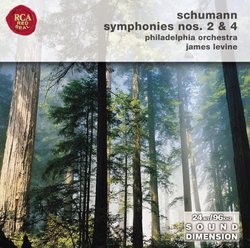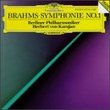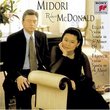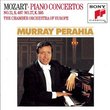| All Artists: Robert Schumann, James Levine, Philadelphia Orchestra Title: Schumann: Symphonies Nos. 2 & 4 Members Wishing: 0 Total Copies: 0 Label: RCA Original Release Date: 1/1/2000 Re-Release Date: 1/13/2004 Album Type: Original recording remastered Genre: Classical Style: Symphonies Number of Discs: 1 SwapaCD Credits: 1 UPC: 828765530521 |
Search - Robert Schumann, James Levine, Philadelphia Orchestra :: Schumann: Symphonies Nos. 2 & 4
 | Robert Schumann, James Levine, Philadelphia Orchestra Schumann: Symphonies Nos. 2 & 4 Genre: Classical |
Larger Image |
CD DetailsSimilarly Requested CDs
|
CD ReviewsRiveting, joyous readings from the young Levine Santa Fe Listener | Santa Fe, NM USA | 02/10/2006 (5 out of 5 stars) "Levine's Schumann has been out of print from both companies that he made complete symphony cycles for, BMG and DG. The latter, from 1988 with the Berlin Phil., shows greater sensitivty, originality, and refinement than the earlier set with the Philadelphia Orch. Having said that, it's wonderful to see this reissue of Sym. #2 and 4. The performances are virtuosic and propulsive, and thtere are moments, such as the whole devlopment of the opening movement of the Second, that are hair-raising in their excitement. The Fourth is just as good; it avoids the pitfalls of over-phrasing and waywardness that one often hears. Levine picked up from his mentor George Szell a prefernce for lean-textured Schumann, but he outshines Szell in flexibility and rhapsodic abandon. It's too bad that Levine's work has been overshadowed by other great Schumann conductors like Bernstein and Karajan, because he desdrves to stand with them. The sonics here are more natural and open than on the DG remake, which is noticeably shrill. There are lots of good budget recordings of Schumann symphonies out there--the ones wwith Kubelik and the Bavarian State Orch. on Sony are particularly worthwhile--but for heroic, impetuously joyous performances, nothing I've heard comes close to this CD." Has this orchestra ever sounded better? H. Stokar | New York, New York USA | 06/06/2006 (5 out of 5 stars) "Why must we wait for the re-issue of 1 & 3? These recordings are a joy." Return of the King: Levine & Philadelphia do Schumann Dan Fee | Berkeley, CA USA | 01/16/2004 (5 out of 5 stars) "When I suddenly bumped into the surprise re-release of this favorite former recording of the Schumann symphonies at one of my local stores, I was mightily pleased to snap it up right on the spot. First off, the sound of the famously rich-stringed Philadelphia Orchestra is captured very well in this set of recordings (don`t forget the creamy woodwind playing and the burnished sounds of the brass). The combination of James Levine's youthful ardor with Schumann's heroic-lyrical drama and poetry as written into this music is simply not easily matched by the other available recordings. Yes, this CD gives us symphonies two and four, while one and three are presumably waiting to be re-released sometime in the future. (One hopes, the near future.)
Schumann's four symphonies have often been dismissed with faint praise, or even with outright disdain. The orchestrations are frequently faulted, accused of more than a sniff of musical awkwardness or of amateurishness. However, as original or period instrument performances led by Gardiner and by Norrington have revealed only too well in past recordings, the infamous problems of balance among strings, woodwinds, and brass in the orchestra are almost automatically solved by the naturally occurring tonal characteristics of period instruments when these symphonies are played on them. Having said this, it is patently obvious that the Philadelphia Orchestra is NOT playing here on period or original instruments. Yet, thanks to the innate performing genius of this renowned orchestra, as well as the leadership genius of conductor James Levine, you forget that there was ever a question about the abilities of dear old Robert Schumann to orchestrate, in the first place. Everything seems to sing right through and sing right out, cleanly and clearly, without muddiness or any impression of faulty balances.Beyond such clarity, the musical narrative is by turns -- vigorous, or moody -- and always moving right along in these interpretations. Tempos are varied, as they should be, but the momentum is never compromised in favor of uber-pseudo-Romantic languishing or in favor of slick virtuoso rushing, when something more forthright and more lovely will do. Solo playing from the different first chair departments of the orchestra is exquisite in tonal beauty, while always being inflected or phrased just so. Some passages swing or sway with the gentlest of melody or texture, while others stomp and shake with the sturdiest purpose. Such beauty and strength may remind us that Schumann was above all a genius of song, and of so much more via these symphonies.The 24 bit/96 Khz remastering is quite good. If your system tends towards brightness, you may find the Philadelphia strings with a bit more steel in their glitter than you would otherwise like. Perhaps this remasting signals that these gems of the BMG catalogue (inherited/swallowed up from American RCA vaults) will eventually make it to DVD-audio or to SACD, and the altogether wonderful possibilities of a high resolution carrier.However that may be, don't hesitate to get these performances, now. The fact that their pricing is affordable only makes finding this lost treasure that much more rewarding.These stellar interpretations (like their companions, the Levine/Chicago Brahms symphonies) have been absent too many years from the catalogue. Even if you haven't before been able to stay the course while listening to the Schumann symphonies, you may discover that this set of performances will do the trick, though others have failed you. If you already love Schumann's symphonies, then these performances will simply remind you of that attachment, rekindling the fires of the heart and mind with which this music breathes so magically. Highly, highly recommended, then. Ten Stars." |








